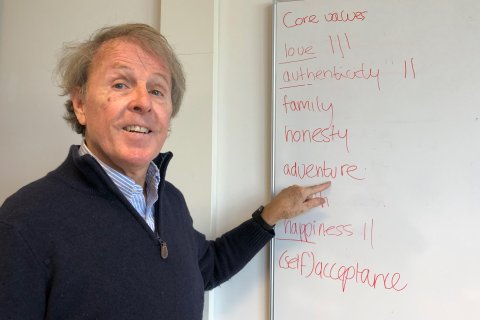Talk about values, and life
Care for the wellbeing of students stands central to the broad approach on study and life at University College Utrecht. “There seems to be a real need among students to reflect on one’s values and identity,” says Psychology lecturer Robert Dunn, who runs Life Skills and Values workshops for students.

A University College Utrecht long-timer, Robert Dunn has witnessed the hardening and elaborating of academic standards and expectations, which has led to a change in students’ attitude to their time on campus as well. “More students are now worried about meeting the requirements of the course than really engaging with the material,” he says.
Balanced attention to students’ wellbeing is part and parcel of the Liberal Arts and Sciences philosophy that is the very kernel of the University College. The Life Skills and Values workshops contribute to this balance, next to individual counselling by the Student Life Officer and tutors, and events such as the annual Wellbeing Focus Weeks.
Positive psychology
“The Life Skills and Values workshops are voluntary, students do not earn any credits, they take place in the evening hours, and still they are very popular. There seems to be a real need to reflect on one’s values and identity, and how they may lead to certain decisions.”
“The idea to organise such workshops originates from my workshops courses on positive psychology, and on an article I read some years ago about a survey at Harvard University. There, alumni were asked about things they did not learn at college but would have liked to. Reflecting on how to live one’s life was on the top of the list. Then eventually Stanford University started organising Values Workshops, and I imported the concept from there. My colleagues and I now run these workshops for the ninth semester.”
“If you ask me, I think the bachelor study is exactly the right moment for these workshops. These folks are on their own for the first time in their lives and thinking about what is important, what are their values, where do they want to go from here, after the University College.”
Next to Robert and his colleagues, the workshops also involve alumni. “Their contribution is important, as they can look back at their time at the College and share experiences with some perspective.”
Good things in life
Things that typically come up in the small setting – the workshops have at maximum ten students per group – are personal experiences that shape one’s identity and values, and the unique strengths of each of the participants. Robert, who is practising psychotherapist next to his position at the University College, likes to employ methods from positive psychology to have students think of the way their values are constructed. Sharing those values and the experiences they are based on is an important element in the workshops.
“One of my favourite exercises is very simple. We ask students to think of three good things they have experienced on a certain day. This can be anything: enjoying the sunshine, or a delicious smell of coffee. Such consciousness has a positive input on one’s daily life.”
The workshops are rewarding also for the lecturers, says Robert. “One of the students told me upon her graduation how important the workshop had been for her in her first year at the College. It had given her the opportunity to talk about things she never had talked with her friends or family before. Such feedback gives me a lot of energy.”

